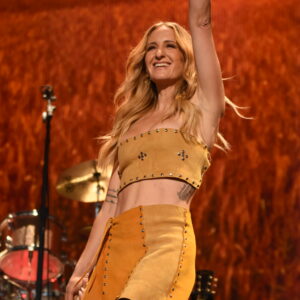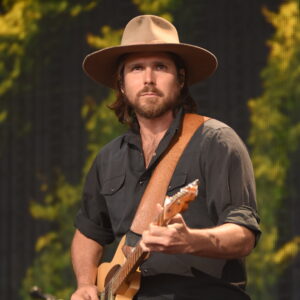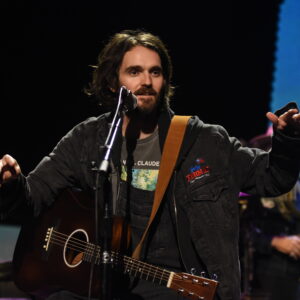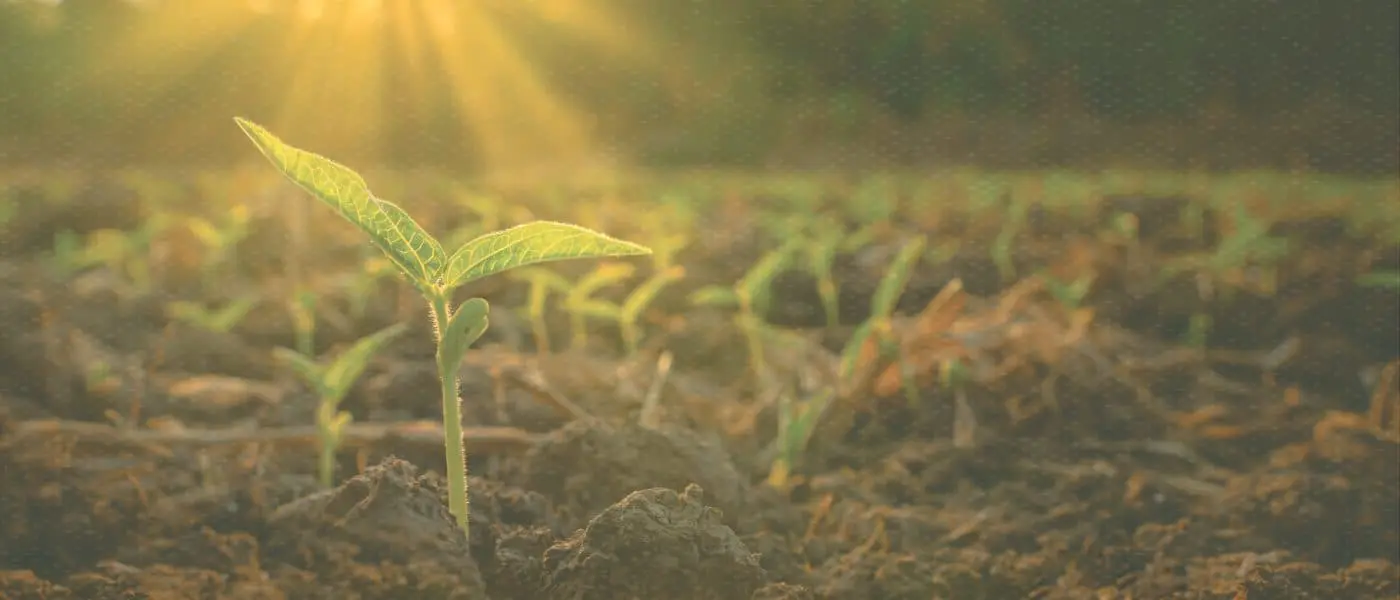Welcome to a new series of Against the Grain: The Farm Aid Podcast. Our present political moment is the perfect time for us to bring you this special series where, over seven episodes, we’ll talk to more than two dozen artists who are using their art and their voices as vehicles for political engagement and expression on issues that matter to them – and to all of us. In this introductory episode, hear snippets from some of these artists to whet your appetite for the season to come. Artists in this intro episode include Farm Aid board artists Dave Matthews, Margo Price, as well as Lukas Nelson, Charley Crockett, Micah Nelson, Bruce Springsteen and Doechi
Listen to the episode below. And, make sure to subscribe in your podcast app of choice!
Companion Video Playlist
Watch artists featured in this episode in this companion video playlist!
Artists and Activism Series – Intro Episode
Michael Stewart Foley: Welcome back to Against the Grain the Farm Aid Podcast. If you’re joining us for the first time, this podcast is designed to bring the magic of Farm Aid’s annual festival to your ears year round. We talk to farmers and artists, advocates, and food experts, activists and policymakers, all of whom are working towards building a more just and equitable farm and food system.
Michael Stewart Foley: I’m one of your hosts, Michael Stewart Foley.
Jessica Ilyse Kurn: And I’m Jessica Ilyse Kurn. We’ve been cooking up something special for you since our last season that connects artists and activism. After all, Farm Aid now in its 40th year is one of the high profile examples of artists showing up on behalf of a mission and certainly the longest lasting.
Willie Nelson: We just heard some good news, a million dollars worth of you folks have just walked through the doors up there, a million dollars to help the small family farmer and to help call attention to his problems. And the folks are still walking this way. It’s gonna be a good day. We’re gonna talk to a lot of people. We’re gonna get our message across and we will make a change. We will make a difference. 7 million new farmers on the land. Let’s plant that seed.
Jessica Ilyse Kurn: Our founder, Willie Nelson, has served as an artist activist role model for so many artists
Michael Stewart Foley: Over the years the Farm Aid stage has hosted more than 500 artists who’ve donated their time and talent on behalf of not only family farmers, but all of us who want to eat good food, who believe in justice and equality, and who want our children to grow up on a healthy planet.
Michael Stewart Foley: Each year we visit with artists at our annual Farm Aid festival, and we also catch up with them throughout the year at other events. In each interview, we ask people if they consider themselves to be a political artist and what that means to them. The range of responses has been fascinating.
Jessica Ilyse Kurn: So we’ve compiled a series about artists and activism consisting of seven episodes on different topics. Now, as an intro to that series, let’s listen to snippets of some of the artists we chatted with to whet your appetite. Here are Farm Aid board members, Dave Matthews and Margo Price on what being a political artist means to them.
Dave Matthews: Maybe everyone says this, but I don’t know that anything isn’t political, and I think any action or lack of action is a political act, and, I think to not be informed or to be ill-informed is a political act. Being involved in Farm Aid is hopefully an act of community, but also an act, a political act, because it all is part of it. Politics are just a reflection, especially in general in a democracy. It’s a reflection of the population we’re supposed to be. Yeah, sure. I think I’m not a politician, but I think I, I’m political
Margo Price: I think of myself as an artist, and I think also as a cultural worker, I think the songwriting is so much a part of my soul that, sometimes it’s a lot of emotions and so therefore it becomes political because really everything is political and whether we want it to be or not.
Michael Stewart Foley: Lukas Nelson, on the other hand, has this perspective.
Lukas Nelson: Yeah, no, I don’t consider myself an activist or a political, anybody necessarily. Only in the sense that, you know, I I’m affected by the world around me. And but I think when it comes to politics, there’s too much that can get muddied by partisanship. And if somebody that you don’t happen to agree with politically says something good, it makes it difficult for you to agree with them or to acknowledge publicly because I’m aligned with the whole other side, and so I don’t subscribe to any of that. I think if you have a good idea and you present it, then then it doesn’t matter where it’s coming from, and we can compartmentalize those things.
Now, as an artist myself I prefer to put my statements in my music. I prefer to put my statements in my art because I don’t believe that if I wanted to be a politician and stand on a soapbox, I would go out and do that. But I don’t want to alienate anyone.
Jessica Ilyse Kurn: Michael, don’t you love how Lukas identifies how things can get muddied, by partisanship?
Michael Stewart Foley: Yeah, for sure. It’s a really relatable take on it, especially now in our current political climate.
Jessica Ilyse Kurn: And here’s Charley Crockett. He answers the question of if neutrality is even possible.
Charley Crockett: I think it was, I don’t know who said it, but to it’s political to be alive is to be political. And when you’re on a moving train, can’t exactly be neutral.
But in the, when they said that Johnny Cash wanted it both ways, he tried to walk the line. I think no matter what the political beliefs of an artist are, you are walking [00:05:00] on the line, because. It’s not that different from politicians. The big difference being that we tell the truth.
Jessica Ilyse Kurn: Micah Nelson, like his brother, Lukas, had a broad view approach to his answer.
Micah Nelson: No, not really. No. I don’t think any of this is political at all. It’s just about being a person on a planet and deciding whether you’re interested in supporting life or not. The soil is the most fundamental source of life, and it’s so much deeper than politics. It’s so much more cosmic than that. More existential than that.
Michael Stewart Foley: Cassandra Lewis thinks it’s part of her job to be loud about things that matter. Take a listen.
Cassandra Lewis: It’s funny. It just depends on who you talk to, whether you’re political or not, they’ll decide for you. A lot of the times, everything we do, every decision we make, every noise we make is political to somebody. And it’s important because we should have a choice in what our lives look like and what our communities look like. And I think part of my job is to be loud about things that matter to me and help to build bridges between, people who maybe didn’t think there was water or didn’t think there was even a path, so for absolutely I’m political music and politics.
People say shut up and sing, right? Oh, you should just stick to singing. It’s music has never been apolitical, ever. And I think it’s just, if you’ve got something to say, just come out say it. And you better be able to give it something to stand on.
Jessica Ilyse Kurn: Shut up and sing is the opposite of what Farm Aid has been doing these last 40 years.
Michael Stewart Foley: Yeah, exactly. It’s so interesting to hear these varied and nuanced perspectives and how these artists navigate the intersection of art in politics, right?
Jessica Ilyse Kurn: Yeah, it’s a hot topic in this political climate. A number of highprofile artists have spoken up recently
Bruce Springsteen: In my home, the America I love. The America I’ve written about that has been a beacon of hope and liberty for 250 years is currently in the hands of a corrupt, incompetent, and treasonous administration.
Michael Stewart Foley: That was Bruce Springsteen speaking to the crowd in Manchester, England at the first show of his current Land of Hopes and Dreams Tour, offering his views of the current administration, and he wasn’t done. A little later in the show he kept going.
Bruce Springsteen: In America, they are persecuting people for using their right to free speech and voicing their dissent.
This is happening now in America. The richest men are taking satisfaction and abandoning the world’s poorest children to sickness and death.
This is happening now in my country. They’re taking sadistic pleasure in the pain that they inflict on loyal American workers. They’re rolling back historic civil rights legislation that led to a more just and plural society. They’re abandoning our great allies and siding with dictators against those struggling for their freedom. They’re defunding American universities that won’t bow down to their ideological demands. They’re removing residents off American streets. And without due process of law are deporting them to foreign detention centers and prisons. This is all happening now.
Michael Stewart Foley: You may have heard about it when it happened. The president responded to Springsteen via social media, calling him a pushy, obnoxious jerk, and said that he is dumb as a rock. This dried out prune of a rocker, Trump went on, ought to keep his mouth shut until he gets back into the country. Then we’ll see how it goes for him.
Jessica Ilyse Kurn: A few days later, the president posted a video of himself teeing off at a golf course, edited to look as though the golf ball hit Springsteen and knocked him over.
Michael Stewart Foley: Yeah, so we’re not only in Farm Aid’s 40th year, we’re living in a time of, shall we say, vigorous political debate where many artists are stepping into the political arena, some for the first time, and they’re using their platforms and their voices on the issues that are important to them.
Jessica Ilyse Kurn: Another example, 26-year-old Doechii accepting the award for best female hip hop artist at the BET ceremony in Los Angeles as protestors clash with ice agents and police outside that venue.
Doechii: As much as I’m honored by this award, I do wanna address what’s happening right now outside of the building. There are ruthless attacks that are creating fear and chaos in our communities. In the name of law and order. Trump is using military forces to stop a protest. And I want y’all to consider what kind of government it appears to be when every time we exercise our democratic right to protest the military is deployed against us. What type of government is that?
Michael Stewart Foley: Our present political moment is the perfect time for us to bring you this special series on artists and activism, where over seven episodes we’ll talk to more than two dozen artists who like Springsteen and Doechii are using their art and their voices as vehicles for political engagement and expression on issues that matter to them and all of us.
Jessica Ilyse Kurn: Please subscribe to our podcast and share it with friends because we’ll be rolling out episodes throughout the summer as we head towards Farm Aid 40 at Huntington Bank Stadium in Minneapolis. That’s on Saturday, September 20th. Keep on listening and we hope to see you in person in Minneapolis. For more information, go to farmaid.org/podcast and you can learn all about tickets and details.
Michael Stewart Foley: Don’t miss the companion playlist for each episode, which can be found on our website, farmaid.org/podcast.
Jessica Ilyse Kurn: Is there something you want us to cover in the future? Send us an email or drop a comment. You can email us. At podcast@farmaid.org and find us on social media, which is @Farm Aid, on Instagram, Facebook, Threads, and now on Blue Sky.
Michael Stewart Foley: And don’t forget YouTube where you can watch almost 40 years of performances and other content let your friends know about Against the Grain. We’re beyond grateful when you listen, share, and subscribe to this podcast.
Jessica Ilyse Kurn: Against The Grain was written and produced by us with sound editing by End House Media and direction from Dawn Sorokin. And thanks to Micah Nelson for our awesome theme music.
Michael Stewart Foley: Thanks so much to all the artists who took the time to speak with us. Head over to our website to watch videos. Check out those playlists and learn more. www.FarmAid.org/podcast. And thanks to all the farmers out there. We’ll chat with you next time.
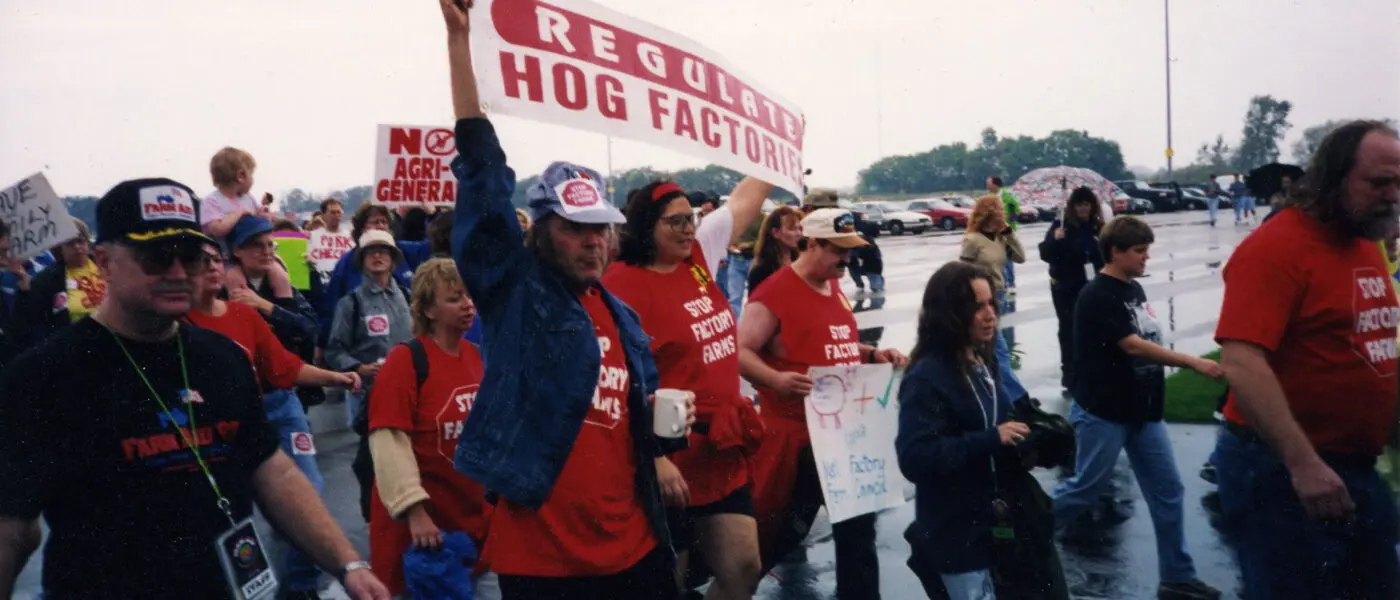
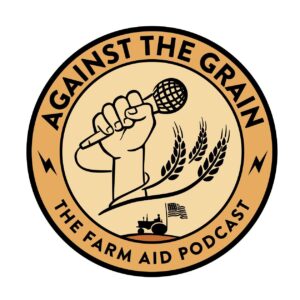 Against the Grain brings the magic of Farm Aid’s annual festival to listeners year-round. Hear from farmers and artists, advocates and food experts, activists and policymakers – all of whom are working towards building a more just and equitable farm and food system.
Against the Grain brings the magic of Farm Aid’s annual festival to listeners year-round. Hear from farmers and artists, advocates and food experts, activists and policymakers – all of whom are working towards building a more just and equitable farm and food system.


